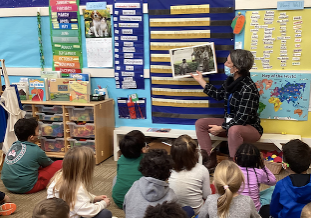Black History: Beyond the Month of February
February 22, 2022

For the youngest children who are oriented towards the here and now, it may be appropriate to begin with reading picture books that feature Black protagonists and lift up black voices, experiences, and joy. As a family, you can also look at the work of Black artists in books, online, and in-person at museums. Identify the choices these artists make and the mediums they choose, and try to create work inspired by these artists!
As you begin to read books about Black historical figures and unpack this country’s complex history with your children, I find it helpful to start with meaningful and relevant scenarios. In advance of reading a story about Dr. King, you might ask your child, “Have you ever been treated unfairly or left out?” or “Have you ever seen someone else treated unfairly or left out?” Next, you can describe Dr. King’s childhood and some of the things that felt unfair to him – that he wasn’t allowed to go to school with white people or swim in the same pools – and how he did something about it.
Emphasize for your child that Dr. King wrote about his experience, he spoke about it, and he organized marches with other people who also felt things were unfair. He changed the way people thought, and because of this he is currently remembered as a hero in our country. Starting with the injustices that our children have experienced or witnessed allows them to be inspired by Dr. King’s actions and begin to see themselves as change agents and advocates for themselves and others.
It is also important for children to know that a leader like Dr. King doesn’t act alone, nor was he the only leader that fought for racial justice. Movements take all kinds of people; a leader often shares the message for a group of people who are all fighting for the same thing. Expand your child’s exposure to other Black activists and historical figures, women who have fought for equal rights, and white people who have fought alongside people of color against inequities.
Martin Luther King, Jr. Day and Black History Month honor the work that has been started and they remind us of the work we need to continue doing. The bravery to stand up against injustice is often fueled by love. Our children need to be in relationship with all kinds of people, in school and outside of school, to foster the respect and appreciation needed to propel them into action.
Tips for courageous conversations with your children:
Martin Luther King, Jr. Day and Black History Month honor the work that has been started and they remind us of the work we need to continue doing. The bravery to stand up against injustice is often fueled by love. Our children need to be in relationship with all kinds of people, in school and outside of school, to foster the respect and appreciation needed to propel them into action.
Tips for courageous conversations with your children:
- You can always say to your child, “That’s a great question, but I want to think it over before I answer.” Similarly, if you feel you haven’t answered something well, you can always say, “You mentioned something yesterday and I want to revisit it.” Brainstorm with others that you trust.
- If your child asks a difficult question, better to say something than to be silent. Silence sends a loud message and leaves your child left to draw their own conclusions.
- As we work to educate our students and children, we need to be continuously educating ourselves. There is so much to learn….it is a process!
Books to extend the learning at home
(Links are to a black-owned bookstore in Hartford – The Key Bookstore):
(Links are to a black-owned bookstore in Hartford – The Key Bookstore):
Happy Birthday, Martin Luther King by Jean Marzollo
Beautiful Blackbird by Ashley Bryan
The Peace Book by Todd Parr
Beautiful Blackbird by Ashley Bryan
The Peace Book by Todd Parr
Posted in News